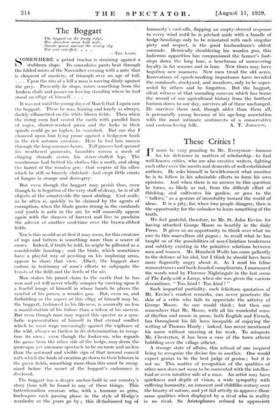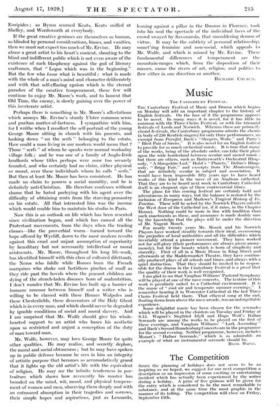These Critics
IT must be very puzzling to Mr. Everyman—famous for his deference in matters of scholarship—to find well-known critics, who are also creative writers, fighting each other over the merits and demerits of well-established authors. He asks himself in bewilderment what monitor he is to follow in his admirable efforts to form his own opinions. And when there is no answer to this question he turns, as likely, as not, from the difficult effort of thinking, and cultivates his garden, or goes to the " talkies," as a gesture of incredulity toward the world of ideas. It is a pity, for, when two people disagree, then is the opportunity for the onlooker to learn something of the truth.
We feel grateful, therefore, to Mr. St. John Ervine for having attacked George Moore so heartily in the daily Press. It gives us an opportunity to think over what we owe to this marvellous old pagan ; to recall what he has taught us of the possibilities of non-Christian tenderness and subtlety existing in the primitive relations between men and women. Mr. Humbert Wolfe has come gallantly to the defence of his idol, but I think he should have been more flagrantly angry about it. As I read his feline remonstrances and back-handed compliments, I murmured the words used by Florence Nightingale in the last scene of The Lady with a Lamp, when she was given the various decorations, " Too kind ! Too kind ! "
Such impartial partiality, such felicitous quotation of Mr. Ervine's crudest remarks, can never penetrate the skin of a critic who fails to appreciate the artistry of George Moore. So one would think ; but then one remembers that Mr. Moore, with all his wonderful sense of rhythm and music in prose, both English and French, has throughout his life been incapable of enjoying the writing of Thomas Hardy ; indeed, has never mentioned his name without sneering at his work. To misquote Mr. Chesterton, it has been a case of the town atheist babbling over the village atheist.
A strange state of affairs, this refusal of one inspired being to recognize the divine fire in another. One would expect genius to be the best judge of genius ; but it is not so. This matter of recognition of the qualities of other men does not seem to be connected with the intellec- tual or even intuitive side of a man. An artist may have quickness and depth of vision, a wide sympathy with suffering humanity, an innocent and childlike ecstasy over the beauty of nature, and yet fail utterly to approve those same qualities when displayed by a rival who in reality is no rival. So Aristophanes refused to appreciate Euripides ; so Byron scorned Keats, Keats sniffed at Shelley, and Wordsworth at everybody.
If the great creative geniuses are themselves so human, so blinded by personal considerations, biases, and vanities, then we must not expect too much of Mr. Ervine. He may abuse a great artist to his heart's content, shouting to the blind and indifferent public which is not even aware of the existence of such blasphemy against the god of literary craftsmen, that " Logos which was in the beginning." But the few who know what is beautiful ; what is made with the whole of a man's mind and character deliberately and with that self-effacing egoism which is the eternal paradox of the creative temperament, these few will continue to enjoy Mr. Moore's work, and to lament that Old Time, the enemy, is slowly gaining over the power of this inveterate artist.
Perhaps there is something in Mr. Moore's affectations which annoys Mr. Ervine's sturdy Ulster common sense and puritan matter-of-factness. I sympathize with him, for I writhe when I recollect the self-portrait of the young George Moore sitting in church with his parents, and looking down " on the serfs " belonging to the estate. How could a man living in our modern world mean that ? Those " serfs " of whom he speaks were normal workaday village folk ; and he was one of a family of Anglo-Irish landlords whose titles perhaps were none too securely founded, and who certainly had no claim, either physical or moral, over these individuals whom he calls " serfs." But then at least Mr. Moore has been consistent. He has made no claim to possess a social morality, and he is definitely anti-Christian. He therefore confesses without shame that he hated parleying with his agent over the difficulty of obtaining rents from the starving peasantry on his estate. All that interested him was the income which would enable him to maintain his studio in Paris.
Now this is an outlook on life which has been resented since civilization began, and which has caused all the Protestant movements, from the days when the trading classes—like the proverbial worm—turned toward the hope offered by Wycliff, down to the most modern revolts against this cruel and unjust assumption of superiority by hereditary but not necessarily intellectual or moral aristocrats. Mr. Moore, throughout 'his long life-work, has identified himself with this class of cultured dilettanti, the Neros who fiddle while Romes burn the French marquises who shake out fastidious pinches of snuff as they ride past the hovels where the peasant children are dying of the stench-laden diseases born of malnutrition. I don't wonder that Mr. Ervine has built up a barrier of humane rancour between himself and a writer who is willing to be classed with these Horace Walpoles and these Chesterfields, these desecrators of the Holy Ghost Which is in every man, and which should never be degraded by ignoble conditions of social and moral slavery. And I am surprised that Mr. Wolfe should give his whole- hearted support to an artist who bases his aesthetic upon so restricted and unjust a conception of the duty of man toward man.
Mr. Wolfe, however, may love George Moore for quite other qualities. He may realize, and secretly deplore, the moral and social obtuseness ; but he may have spoken pp in public defence because he sees in him an integrity of artistic purpose that becomes so accumulatively grand that it lights up the old artist's life with the equivalent of religion. He may see the infinite tenderness in por- traiture which shows how reverently his master has brooded on the mind, wit, mood, and physical tempera. ment of women and men, observing them deeply and with an entranced absorption in their tragedies and sorrows, their simple hopes and aspirations, just as Leonardo, leaning against a pillar in the Duomo iii Florence, took into his soul the spectacle of the individual faces of the crowd swayed by Savonarola, that smouldering demon of virtue. It may be the subtlety of personal relationship, somettling feminine and non-social, which appeals to Mr. Wolfe, and which is missed by Mr. Ervine. These fundamental differences of temperament arc the mountain-ranges which, from the disposition of their masses, cause the rivers of art, religion, and politics to flow either in one direction or another.
RICHARD CHURCH.

































 Previous page
Previous page